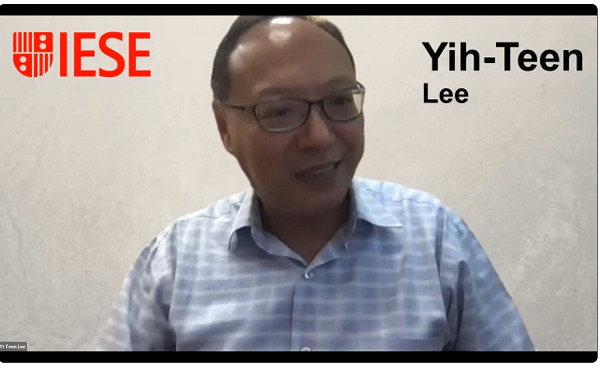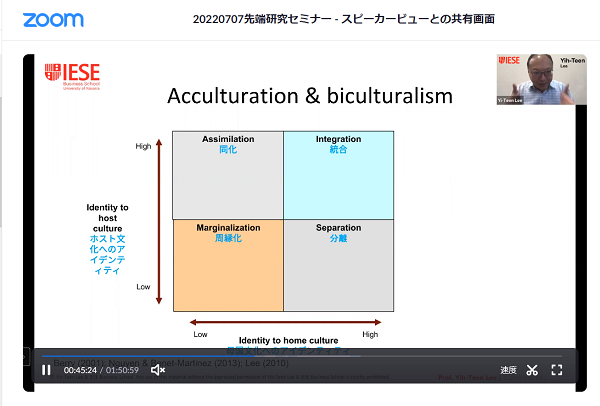・日時:2022年7月7日(木)16:10-17:40
・表題:Harnessing the Strengths of One's Cultural Selves: Multicultural Identities at Work
・講師:Yih-Teen LEE 先生(Department of Managing People in Organizations , IESE 教授)
・開催様式:オンライン開催
・講演言語:英語
講演概要
Cultural identity, a specific form of social identity which refers to a person's degree of identification and sense of belonging to a specific cultural group, has been extensively examined as a kind of social identity over the past decades, especially in the fields of migration, cross-cultural psychology and applied international management. Meanwhile, exposure to settings with different cultures typically triggers a process of acculturation, enabling individuals to develop multicultural identities, whereby people see things from multiple cultural groups' perspectives, feel at one with the cultural groups, and act according to the norms of those cultural groups. Individual organizational members serve as the conduit by which culture influences and is influenced by organizational life.
There exist various forms of multicultural identities with different psychological and behavioral implications on individuals. In terms of plurality, to date, extant studies accumulated extensive knowledge on biculturalism, which focuses on individuals having two distinct cultural identities and how these identities intersect and influence the individual. Beyond biculturalism obtained through birth, ancestry or immersive foreign experience, individuals may become multicultural by being simultaneously immersed in more than two cultures; a situation common among children of immigrants (i.e., second-generation immigrants), children raised in multicultural households, third culture individuals who spend their formative years outside their passport country, and individuals living within multicultural societies.
A key to understanding multicultural identities is how these multiple identities are structured within individuals. Scholars largely agree that the structural pattern of identities affects the outcomes and degree of synergy among multiple identities. Widely accepted modes of structuring multiple identities include relative strength of identities involved; and how multiple identities relate to each other. Scholars have built on these lines of thinking to examine specific forms of multicultural identities and their outcomes. Furthermore, research indicates that multiculturals possess unique resources relevant to organizational life, including: cognitive strengths relational capital & belonging; relational capital & belonging; leadership-related competencies and remaining questions on identity resources.
Although there is evidence for responsiveness of multicultural identity to situational cues, there are also strong arguments made in favour of the agency of individuals over their multiple identities. The foregoing notwithstanding, individuals with multicultural identities must balance their agentic enactments of identity with societal requirements of legitimacy. In particular, business organizations play a vital role in providing identity workspaces and other enabling factors which legitimize the multicultural identities. Additionally, business organizations play the role of balancing power, status and other dynamics between multicultural and non-multicultural members.
講演報告
個人の持つ文化的背景と組織の文化とは相互影響の関係にある。個人は多様な文化を体験することを通じて多文化アイデンティティを形成し、やがて多文化視点から物事を見るようになり、組織に対し一体感を持つと同時に規範も受容していく。グローバル化の影響により、個人は出生地、先祖の地を超えた3つ以上の文化から影響を受ける多文化者が増えている。多文化者のアイデンティティ形態は認知の強み、関係性資本・帰属、リーダーシップ関連の競争力といったユニークな資源の形成に影響を与えていることは海外の最近の研究で明らかにされている。日本の経営学分野ではまだこのような議論が極めて少ない。
本セミナーの講師Yih-Teen LEE教授は、職場で如何に文化的自我から生まれたアイデンティティ資源を認識し活かせるかを問いかけた。LEE教授によると、個人と文化との関係は単純な分類よりも部分的かつ多元的という理解への転換が必要であり、アイデンティティ資源というコンセプトと結合し、個人の多文化への露出要因や個人のなかで構造化された多文化アイデンティティ形態、多文化アイデンティティ資源の3者の因果関係を説明した。そのうえ、アイデンティティをホスト・母国・グローバルの3つの軸で分類し、個人アイデンティティのマッピングのための3次元グローバル文化変容モデル(Comprehensive global acculturation model)を提案した。統合に成功したM&Aリーダーのアイデンティティの検証を通して、個人は自分の文化的アイデンティティを認識し、アイデンティティ資源を意図的に活用できることを示された。アイデンティティの形態はさらに複雑化になるが、多文化主義の潮流は不可避であり、個人のアイデンティティも不断に経験などによって再構成されていくことも示唆された。
セミナーの参加者は多文化アイデンティティの視点の斬新さに触発され、多くの質問が寄せられただけでなく、講師と参加者の活発な交流によりオンライン会場でも言語の壁を越えて大きな反響を呼んでいた。今後日本企業はどのような人材を活かし、また、世界でM&Aを成功させるためにグローバルリーダーをどのように養成するのか、多くの示唆を得られたセミナーだった。
(経済学部 企業経営学科教授 陳韻如)


本講演に関するご質問は
滋賀大学経済経営研究所
TEL : 0749-27-1047
FAX : 0749-27-1397
E-mail: ebr@biwako.shiga-u.ac.jpまでお願いします。
(at)を@に変えて送信してください。





